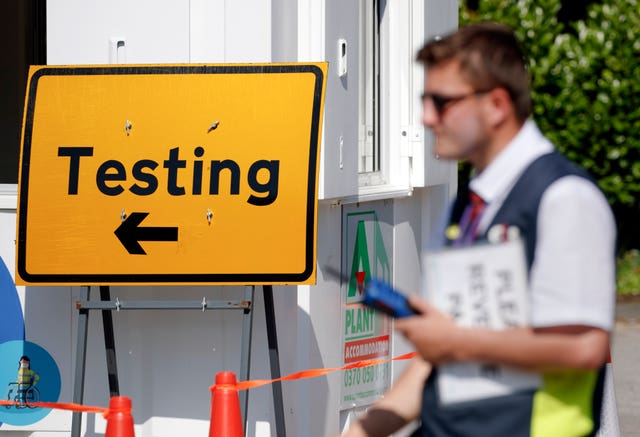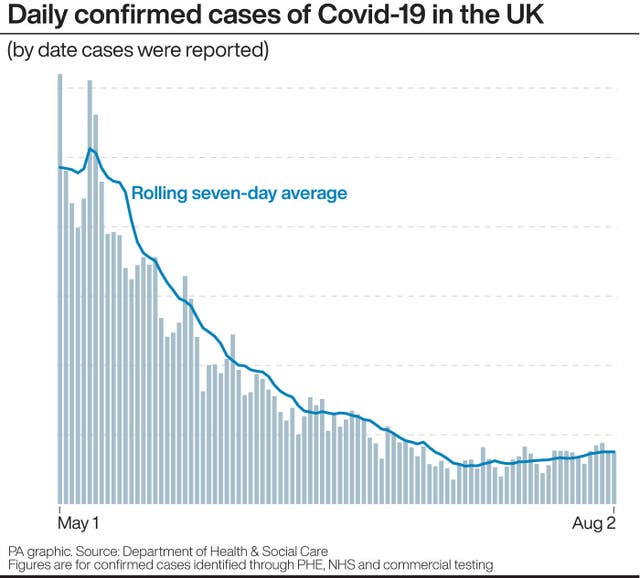Laws enforcing lockdown restrictions yet to be implemented
Legislation was due to be brought into force on Friday.

Laws underpinning new lockdown restrictions for Greater Manchester, parts of east Lancashire and West Yorkshire are yet to be implemented four days after the rules were introduced, the Government has admitted.
Ministers said the rules, placing bans on people from different households meeting following a spike in coronavirus cases, were effective from midnight on Friday.
When the changes were announced, officials said new regulations were needed to make them legally enforceable.
Guidance published on Friday stated that it would be against the law for people from different households to meet in a private home or garden – unless they are part of a support bubble – and warned of £100 fines for those who flout the rules.

Officials said the laws were due to be signed off and published later that night.
But on Monday afternoon the Department of Health and Social Care confirmed it was yet to implement laws bringing the rules into force.
It said it was trying to make the changes legally enforceable as soon as possible but insisted the rules still applied from July 31.
When asked by the PA news agency why there was a delay and on what legal basis the rules were currently being enforced, the department refused to comment.
It was also unable to confirm a time frame for the legislation to be signed off and implemented other than to say it was expected to take place early this week.
The news was lambasted by some human rights lawyers, police figures, campaigners and politicians.
Brian Booth, chairman of West Yorkshire Police Federation, branded the situation “ridiculous”, adding: “The public are being told that officers will enforce the lockdown by the Prime Minister, yet we have been let down and risk community tensions due to not having powers in place. I truly hope the Government gets its act together for any future restrictions.”
Kirsty Brimelow QC, a human rights barrister at Doughty Street Chambers, claimed the Government continued to “bamboozle” the public with its approach, adding: “It is a cynical abuse of government power for ministers to give the impression that their word is law and breaking it can result in fines.”
Silkie Carlo, director of Big Brother Watch, described the move as “lockdowns by diktat”, adding: “Government is telling us to abide by sweeping restrictions with the threat of criminal sanctions despite a total lack of legal authority, no engagement with local officials and chaotic public communications. This is an unthinkable way to govern in a democracy and undermines the rule of law as well as public health measures.”
The Liberal Democrats’ home affairs spokeswoman Christine Jardine said: “It beggars belief that the Government still haven’t put in place the legislation to underpin the local lockdowns in parts of the UK.
“This risks real confusion in the communities affected, as it’s unclear how the new restrictions will be enforced. We need to see government announcements in lockstep with the relevant new laws.”
Police leaders have been issuing guidance to forces on how to enforce restrictions each time a new coronavirus law has been introduced during the pandemic, so officers know the powers available and in what circumstances they can impose fines in a bid to ensure any action taken is fair and proportionate.
But on this occasion, so far this has been unable to happen due to the delay in publishing the laws, it is understood.
The new restrictions apply to Greater Manchester, including the City of Manchester, Trafford, Stockport, Oldham, Bury, Wigan, Bolton, Tameside, Rochdale and Salford.

They also apply to Blackburn with Darwen, Burnley, Hyndburn, Pendle and Rossendale in Lancashire, and Bradford, Calderdale and Kirklees in West Yorkshire.
Similar restrictions will also apply to Leicester, which saw the first so-called “local lockdown” imposed on June 29.
Health Secretary Matt Hancock announced the decision in a series of tweets on Thursday after there had been an increasing rate of transmission in parts of Northern England.
Muslims celebrating Eid in the affected areas were urged not to host or visit friends and family in each other’s homes or gardens and not to meet friends and family in other venues – including restaurants or cafes.
The Government faced criticism for unveiling the new restrictions late at night and just hours before they came into force, with some saying this prompted confusion in the communities affected.
While supportive of the measures, Greater Manchester mayor Andy Burnham told the BBC on Friday he had concerns about the way they were announced and said the lack of immediate detail was “disorientating” for the public.





